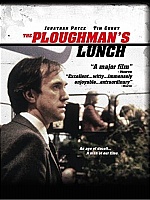
THE PLOUGHMAN'S LUNCH
UK, 1983, 107 minutes, colour.
Jonathan Pryce, Tim Curry, Rosemary Harris, Frank Finlay, Charlie Core, David De Keyser, Nat Jackley, Ken Shorter.
Directed by Richard Eyre.
The Ploughman's Lunch made an impact in Britain in 1983. With a small budget and in collaboration with Channel 4 television, it received a deal of attention as indicating the kind of film Britain could make in the '80s.
The title refers to the allegedly traditional British lunch - but seems in fact to have been a concoction for commercial purposes in the '60s. There is a sardonic, even cynical tone, about the film. The hero is a radio news editor who wants to write a book about Suez. Disowning his working-class background, he insinuates himself into middle and upper class circles. He is not above using people and betraying people. Jonathan Pryce gives a very good performance as this central character, James Penfield. The supporting cast is very good.
The film is also a comment about the political situation under Margaret Thatcher's Prime (Ministership. The end of the film takes place at the time of the !Falklands War, even incorporating newsreel material from the Tory Party I Conference of 1982 with its strong sense of patriotism because of the I Falklands. Another symbol of the times is used - a portrayal of the women at Greenham Common with their protest. The film presents them sympathetically - and then shows the hero cutting them at the Tory conference. The film portrays and criticises the hawkish and right-wing stances of the British government and Britain of the '80s.
1. An interesting and effective drama? The sardonic point of view? The authentic atmosphere of England in the '80s? The world of the media? Of politics? Of British patriotism and right-wing stances under Margaret Thatcher's prime ministership?
2. British film-making of the '80s: small budget, for British audiences, world-wide audiences, specialist touch? The impact of British skills in making television dramas? Efficient film-making: locations, set-ups, characters, drama, comedy? The blending of news footage with the drama of the film - the atmosphere of Greenham Common, the Tory Party Conference?
3. The title and its meaning, as a metaphor? British traditions and enthusiasm for them? Lack of real knowledge about them? British traditions exploited, especially by the media for commercial gain, for political stances?
4. The British background, memories, traditions, past world eminence? The continued reference to the Suez crisis? The decline of British Empire and power? Influence? The nature of history, research and interpretation? Britain in the '80s wanting to rediscover its past, re-live it? The stances of the Tories? The significance of the Falklands war and the British response? How is the Falklands background used in the film? Britain in the '80s: society, the world of media, the commercial world, gossip, ambition? The background of protest: Greenham Common, women, ordinary people, the protest against war, American occupation of Britain, nuclear weapons and deployment?
5. James as the centre of the film: an ordinary middle-aged man, his radio work, ability, interest in history, wanting to write a book? The discussions with the publisher, the deals? Jeremy and his friendship and contacts? The parallel between James and Jeremy? Who exploited whom? His visits to his mother and father, the awkwardness, the silence, his mother's illness, father's devotion? His denying their existence, betraying his background? His relationship with Susan, the affair? Wanting to foster the affair by interest in her mother and the Suez background? The visit to the family home, the stylish way of living in the country, smooth, polite? His not making headway with Susan? Her avoiding him? Anne's interest, the walks, sharing, understanding of the Suez crisis? Matthew and his detachment, encouraging James? The family? The trip back to London, the car breaking down, the encounter with the women at Greenham Common, their friendship, help, cause? The discussions about doing a programme on them? Contact with them because he was stranded? His return, the changes in his life, political involvement, the Tory conference? Susan going with Jeremy? His mother's death - and his reflection on his life? A shallow hero? A political coward? Cynicism and contempt?
6. Jeremy and James? Professional skill, contacts, talk, introductions, cynical? Setting up James? Relationship with Susan?
7. Susan and her strength, background in media work, relationship with James, the affair, relationship with Jeremy? The introduction to her mother? Her aloofness from James at her home? Her final betrayal of him?
8. Matthew Fox - home, family, lifestyle, his television work, the sequence of the commercial being made - and the comment on artificiality, contrivance, financial gain? Commercials as exploitation? Matthew's story of the Ploughman's Lunch? His relationship with Anne? Anne and her family, relationship with Susan, the background of her research, socialist interest and commitment? James' feigning interest in the Left - and as easily having interest in the Right? The walks, talking, her exhilaration? Passion, the affair? Her being used?
9. The book and James' ambitions, status, the discussions with the publisher, having to adapt his book to American college students?
10. The supporting characters and their delineation - the newsreader and his anguish over his broken marriage?
11. The film as a mirror of English society, critique? History and politics? The Ploughman's Lunch as 'a completely successful fabrication of the past': food for thought indeed (Monthly Film Bulletin) ?